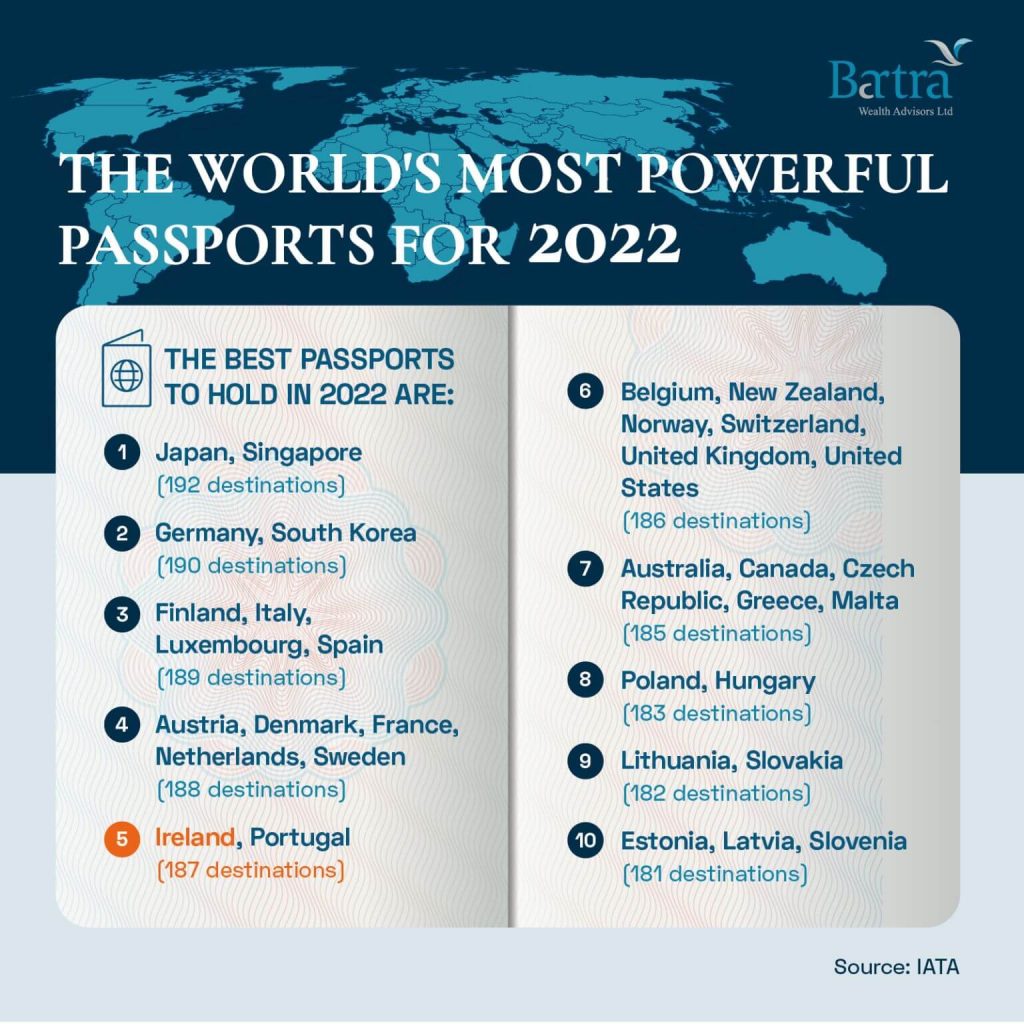The power of a nation’s passport is a reflection of the strength of the country – both economically and politically – in relation to other countries.
Since 2006, immigration consultants Henley & Partners has been using data from the International Air Transport Association (IATA) to rank the powerfulness of the world’s passports according to the number of places in the world their holders could travel visa-free. But there is so much more that comes with a powerful passport than simply ease of travel, from the chance to enjoy an improved lifestyle to business opportunities to family protection.
This year’s list of the world’s most powerful passports saw Ireland rank in joint fifth position with Portugal, placing ahead of other popular immigration destinations including the US, UK, Australia and Canada, and offering holders visa-free access to 187 countries.


Benefits of holding an Irish passport
Not only can Irish passport holders live, work or study in Ireland, where they are guaranteed certain fundamental rights according to the Irish Constitution, including access to free primary and secondary education, the right to vote in Irish elections and be elected to government, and diplomatic support outside the country, but the Common Travel Area (CTA) arrangement between the UK and Ireland means they also have the right to live, work or study in the UK and to vote and access social welfare benefits and health services there.
With strong ties to Europe and as a member of the EU, Ireland’s citizens can also live, work, or study in any of the 27 EU member states as well as in any European Economic Area (EEA) country (this includes EU countries as well as Iceland, Liechtenstein and Norway). They are also granted the opportunity to vote in European elections and can apply for a European Health Insurance Card enabling access to state-provided healthcare in EU, EEA countries and in Switzerland.
Further afield, Irish passport holders enjoy visa-free travel to the US; only ESTA approval is required. Travel to Australia and Canada is also via an Electronic Travel Authorization (eTA).
Another key benefit of the Irish passport is that it can be held along with another passport as Ireland allows dual citizenship. If you become an Irish citizen, you can remain a citizen of another country, which not all nations allow. Neither Singapore nor Japan, for example, which jointly topped the 2022 list of the world’s most powerful passport, allow dual citizenship.
The Irish passport is easy to hold and renew with online services offering fast, secure and convenient renewal. Passport holders can also obtain a passport card, a credit-card sized document that can be used instead of the traditional Irish passport book when travelling in the EU, the EEA and Switzerland. It can be obtained at the same time as the Irish passport (for a higher fee) or can be applied for separately.
Eligibility requirements for citizenship and passport


Those with parents who hold an Irish passport are entitled to Irish citizenship – and in turn, Irish citizenship can be passed to your children. Citizenship is also achieved through naturalization, where a person must have been physically resident in Ireland for a certain length of time. Applicants must have spent five years in Ireland, with each year’s absence not greater than six weeks, or they need to be resident there for at least five years (1825 or 1826 days) over a nine year period with a continuous residency over the 12 months prior to application. Age and character are also taken into account – applicants must be over 18 and of good character – the Garda Síochána, Ireland’s national police, will file a report on the applicant, and background and any criminal record or ongoing proceedings will be considered.
The IIP is a step towards Irish citizenship and an Irish passport. By investing in the IIP, residency can be obtained simply and quickly with a processing time averaging between four and six months. The IIP also allows applicants to add their spouse and any dependent children below the age of 24 to their application. While the IIP does not require long periods of residency for the applicant to maintain their residency (requiring just one day’s stay in Ireland per year), should citizenship and the Irish passport be the goal, the residency requirements for naturalization need to be adhered to. Children who are given a resident status, study in Ireland and reside there for five years can apply for citizenship individually at the age of 18, so parents have greater flexibility to travel and can avoid long-staying resident requirements in the country.
Summary
The benefits of the Irish passport are manifold, from being able to settle in Ireland and be guaranteed certain fundamental rights, to the opportunity to travel freely and live, work and study in a number of other countries. These advantages are also greater than some of those offered through citizenship in other popular investment immigration destinations. On top of that, any existing citizenship can be maintained alongside Irish citizenship. Given the ease of gaining residency through the IIP, investment is the first step of an attainable and rewarding journey to Irish citizenship.
For more information on the IIP and applying for it, please contact your Bartra consultant or get in touch.
